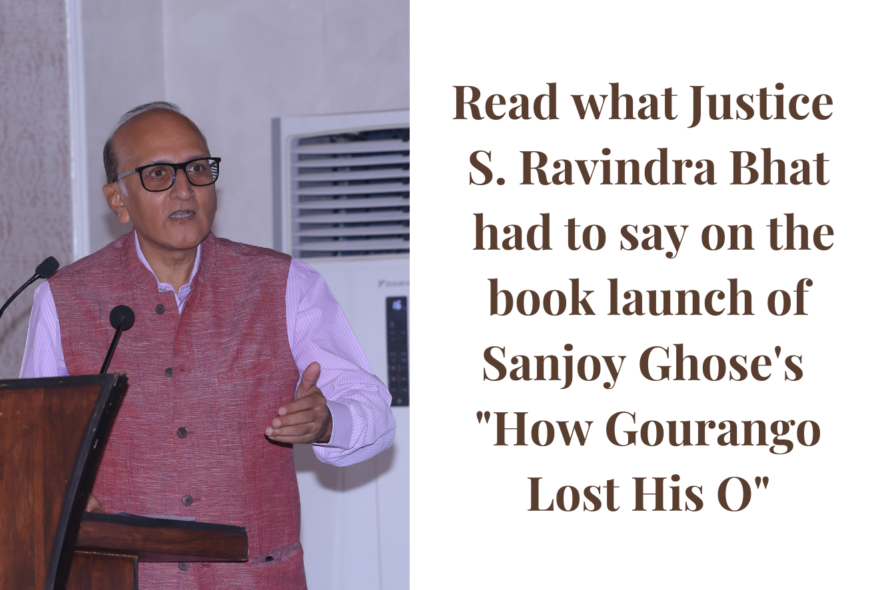Opening Remarks by Justice S. Ravindra Bhat, Judge, Supreme Court of India on the book release of ‘How Gourango lost his O” by Sanjoy Ghose at Bikaner House on 15th May, 2022.
Good evening, Ms. Indira Jaising, Mr. Dayan Krishnan, Mr. Akash Banerjee and Mr. Sanjoy Ghose.
I am delighted to be here and be given the honor of releasing “How Gourango lost his O” authored by Sanjoy, who has ventured into what I hope will be a parallel career in an entirely new genre of fiction. Having the benefit of an advance copy, I read through the whole book. I know that one of the panelists today is going to read excerpts; yet I cannot resist the impulse of making my observations which I hope will not overlap with his. At first, what strikes the reader is the vivid portraiture of each character – the central protagonist, so to speak in a very loose sense, is the litigant Noor and his travails which occupy about sixty percent of the work. The other vivid and detailed portraits are of his lawyer, Keshto Da, and in the later part of the book, the powerful senior of Gourango. In between, there are exquisite pen pictures of characters whom we daily encounter in courts – Snigdha Sarkar, the optimist, who dreamt of being a doctor and ended up being a Court Steno; Narender, whose dreams of being a playback singer shattered and he went on to become a resentful, perhaps even a spiteful Court Master. The surprising thing about the portrayal apart from the vividity is the ability of the author to show the world through the lens of each character and thus lay open to us their unique perspective. Contrary to expectations, the tone adopted by the author is one of sympathy, and at best, gentle irony. Never do you encounter the tone of sarcasm or scorn towards the judges or other lawyers, whether they are in Calcutta or the Delhi High Court; which is where eventually Gourango became Gourang. His practice in Delhi, and the experiences he goes through, strung together form the latter part of the book, which is equally absorbing. The author also delights by bringing us sights, sounds, smells and taste of the Court, including the samosas and tea consumed by practitioners and litigants alike in the canteen, in their quest for justice.
I do not recollect having read legal fiction from Indian authors of our times, which Sanjoy has offered to his readers. The fictional works we come across are all accounts of trials or such. I recollect Henry Cecil who has written about 15 or 20 short novels depicting various situations in the law, and then the famous Sir John Mortimer’s character Rumpole, which was perhaps more popular in my generation. In that sense what the author has offered to us readers is a new kind of writing which gives non-legal readers an insight into the legal world, which from the litigant’s point of view can be bewildering, even terrifying. Like all other professions, who have their specialist lingos, the legal profession is no exception; we chose to revel in it. The author has underlined the utter disconnect between the society that we live in, the language of the world that we inhabit, with its the archaic lingo of our legal world which would make Sir Ernest Gowers (of the Complete Plain Words fame) turn in his grave. Be it in Keshto Da’s resentment of wearing robes; the pathos of his empty existence; Noor’s bewilderment upon encountering the rituals of litigation; the tension which lawyers feel as their cases approach a hearing; and the pressure of work which judges experience and therefore, have to prepare themselves beforehand, in order to get through the day’s work, all are captured in their minutest detail.
I would not like to speak further but to only say that having known Sanjoy for the last 25 years, witnessing a journey who went from an intern to a promising junior and then to his irrepressible best as at the present day, he has never failed to delight. That he has chosen to write fiction is perhaps surprising – yet, the sensitivity which he has brought to the fore in portraying the characters he has created, speaks a lot about the author himself. I congratulate you Sanjoy and wish you success in your second chosen career hereafter!
I also commend the EBC for publishing this genre of writing. It speaks volumes (no pun intended) of their confidence in the author.
I’d like to conclude by reading out a quote from the book, which is but a small reflection of the jewels it has to offer:
““Junior” incidentally is a word now frowned upon in legal circles, much in spinster, actress, disabled and the like. The juniors ay not have been successful in fighting the measly stipends they were paid by senior lawyers under the guise of following an ancient colonial tradition called devilling, they have managed to pariah the term “junior” for the politically kosher “associate” or “colleague”. I am guessing “comrade” would have a Soviet feel to it and hence is avoidable.”
Thank you.
Justice S. Ravindra Bhat,
Judge, Supreme Court of India.
* This speech has been reproduced with kind permission of Justice S. Ravindra Bhat.
**The video of his speech can be accessed here [14:30-22:53 mins]
A copy of the book can be bought here: https://www.ebcwebstore.com/product_info.php?products_id=99101340






